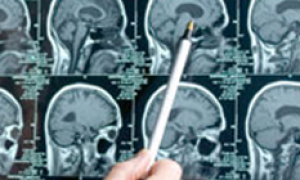Below is a five-part series on the stages of Alzheimer’s disease and is written for the person with the disease, their family and caregivers.
1. Overview
This overview provides a summary of the stages and information on end-of-life issues. It also includes a modified Global Deterioration Scale, a tool commonly used by health care providers to measure the progression of the disease and to classify symptoms often seen at each stage.
Click here to read the overview.2. The Early Stage
The early stage of Alzheimer’s disease (also referred to as “mild Alzheimer’s disease”) marks a beginning that will bring with it significant changes for you and the people who care about you.
Click here to read about the early stage.3. The Middle Stage
Typically, for the person in the middle stage (also referred to as “moderate Alzheimer’s disease”) there is an increasing loss in cognitive and functional ability although many people will still have some awareness of their condition.
Click here to read about the middle stage.4. The Late Stage
In the late stage of the disease (also referred to as “severe” or “advanced Alzheimer’s disease”), individuals experience increased mental and physical deterioration and need 24 hour care.
Click here to read about the late stage. 5. End of Life
Dying is a unique experience for each person, coming in its own time and its own way. However, the process often follows a somewhat predictable path and there are a number of physiological changes that signal that death is near.
Click here to read about end of life.Website Resource – Dementia and End of Life Care

The needs of people with dementia at the end of life are unique and require special considerations. There is an Alzheimer Society website resource available for you – a family member supporting the person with dementia – to help prepare for end of life, make some of the difficult decisions you may face, and cope with the grief and loss you might experience.
Click here to visit the Alzheimer Society’s End of Life Care website.object(Timber\Post)#1976 (46) {
["ImageClass"]=>
string(12) "Timber\Image"
["PostClass"]=>
string(11) "Timber\Post"
["TermClass"]=>
string(11) "Timber\Term"
["object_type"]=>
string(4) "post"
["custom"]=>
array(5) {
["_edit_last"]=>
string(1) "2"
["_wp_page_template"]=>
string(7) "default"
["_thumbnail_id"]=>
string(4) "6938"
["_edit_lock"]=>
string(12) "1744651843:2"
["_yoast_wpseo_content_score"]=>
string(2) "30"
}
["___content":protected]=>
string(4149) "
Below is a five-part series on the stages of Alzheimer’s disease and is written for the person with the disease, their family and caregivers.
1. Overview
This overview provides a summary of the stages and information on end-of-life issues. It also includes a modified Global Deterioration Scale, a tool commonly used by health care providers to measure the progression of the disease and to classify symptoms often seen at each stage.
Click here to read the overview.2. The Early Stage
The early stage of Alzheimer’s disease (also referred to as “mild Alzheimer’s disease”) marks a beginning that will bring with it significant changes for you and the people who care about you.
Click here to read about the early stage.3. The Middle Stage
Typically, for the person in the middle stage (also referred to as “moderate Alzheimer’s disease”) there is an increasing loss in cognitive and functional ability although many people will still have some awareness of their condition.
Click here to read about the middle stage.4. The Late Stage
In the late stage of the disease (also referred to as “severe” or “advanced Alzheimer’s disease”), individuals experience increased mental and physical deterioration and need 24 hour care.
Click here to read about the late stage. 5. End of Life
Dying is a unique experience for each person, coming in its own time and its own way. However, the process often follows a somewhat predictable path and there are a number of physiological changes that signal that death is near.
Click here to read about end of life.Website Resource – Dementia and End of Life Care

The needs of people with dementia at the end of life are unique and require special considerations. There is an Alzheimer Society website resource available for you – a family member supporting the person with dementia – to help prepare for end of life, make some of the difficult decisions you may face, and cope with the grief and loss you might experience.
Click here to visit the Alzheimer Society’s End of Life Care website. "
["_permalink":protected]=>
NULL
["_next":protected]=>
array(0) {
}
["_prev":protected]=>
array(0) {
}
["_css_class":protected]=>
NULL
["id"]=>
int(6931)
["ID"]=>
int(6931)
["post_author"]=>
string(1) "2"
["post_content"]=>
string(4122) "
Below is a five-part series on the stages of Alzheimer’s disease and is written for the person with the disease, their family and caregivers.
1. Overview
This overview provides a summary of the stages and information on end-of-life issues. It also includes a modified Global Deterioration Scale, a tool commonly used by health care providers to measure the progression of the disease and to classify symptoms often seen at each stage.
Click here to read the overview.2. The Early Stage
The early stage of Alzheimer’s disease (also referred to as “mild Alzheimer’s disease”) marks a beginning that will bring with it significant changes for you and the people who care about you.
Click here to read about the early stage.3. The Middle Stage
Typically, for the person in the middle stage (also referred to as “moderate Alzheimer’s disease”) there is an increasing loss in cognitive and functional ability although many people will still have some awareness of their condition.
Click here to read about the middle stage.4. The Late Stage
In the late stage of the disease (also referred to as “severe” or “advanced Alzheimer’s disease”), individuals experience increased mental and physical deterioration and need 24 hour care.
Click here to read about the late stage. 5. End of Life
Dying is a unique experience for each person, coming in its own time and its own way. However, the process often follows a somewhat predictable path and there are a number of physiological changes that signal that death is near.
Click here to read about end of life.Website Resource - Dementia and End of Life Care

The needs of people with dementia at the end of life are unique and require special considerations. There is an Alzheimer Society website resource available for you – a family member supporting the person with dementia – to help prepare for end of life, make some of the difficult decisions you may face, and cope with the grief and loss you might experience.
Click here to visit the Alzheimer Society's End of Life Care website."
["post_date"]=>
string(19) "2016-04-14 15:53:03"
["post_excerpt"]=>
string(97) "This overview provides a summary of the stages of dementia and information on end-of-life issues."
["post_parent"]=>
int(277)
["post_status"]=>
string(7) "publish"
["post_title"]=>
string(27) "The Progression of Dementia"
["post_type"]=>
string(4) "page"
["slug"]=>
string(27) "the-progression-of-dementia"
["__type":protected]=>
NULL
["_edit_last"]=>
string(1) "2"
["_wp_page_template"]=>
string(7) "default"
["_thumbnail_id"]=>
string(4) "6938"
["_edit_lock"]=>
string(12) "1744651843:2"
["_yoast_wpseo_content_score"]=>
string(2) "30"
["post_date_gmt"]=>
string(19) "2016-04-14 15:53:03"
["comment_status"]=>
string(6) "closed"
["ping_status"]=>
string(6) "closed"
["post_password"]=>
string(0) ""
["post_name"]=>
string(27) "the-progression-of-dementia"
["to_ping"]=>
string(0) ""
["pinged"]=>
string(0) ""
["post_modified"]=>
string(19) "2021-01-18 16:02:09"
["post_modified_gmt"]=>
string(19) "2021-01-18 16:02:09"
["post_content_filtered"]=>
string(0) ""
["guid"]=>
string(40) "http://www.alzheimer.mb.ca/?page_id=6931"
["menu_order"]=>
int(2)
["post_mime_type"]=>
string(0) ""
["comment_count"]=>
string(1) "0"
["filter"]=>
string(3) "raw"
["meta_fields"]=>
array(0) {
}
["status"]=>
string(7) "publish"
["pg_extra_pageboxes"]=>
bool(false)
["pg_hide_pageboxes"]=>
bool(false)
}
bool(true)
 The needs of people with dementia at the end of life are unique and require special considerations. There is an Alzheimer Society website resource available for you – a family member supporting the person with dementia – to help prepare for end of life, make some of the difficult decisions you may face, and cope with the grief and loss you might experience. Click here to visit the Alzheimer Society’s End of Life Care website.
The needs of people with dementia at the end of life are unique and require special considerations. There is an Alzheimer Society website resource available for you – a family member supporting the person with dementia – to help prepare for end of life, make some of the difficult decisions you may face, and cope with the grief and loss you might experience. Click here to visit the Alzheimer Society’s End of Life Care website.


